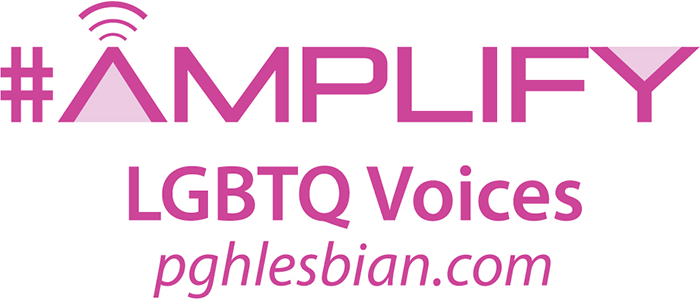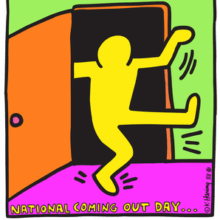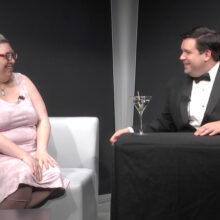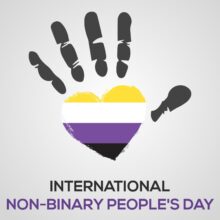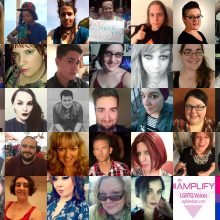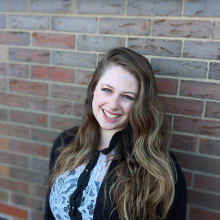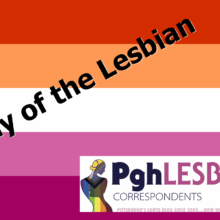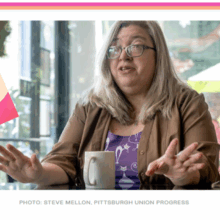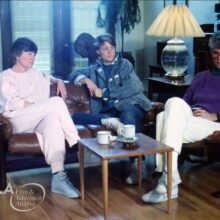I’ve read a few thought pieces on a recent interview out bisexual singer Betty Who gave. She was talking about the recent news from several queer women who are now in relationships with men we are to presume are cisgender heterosexual. Similar to Betty Who.
She got a bit snarky and riled up the lesbians by dragging Renee Rapp into the fray. From TeenVogue
“A huge part of queerness is identifying yourself and putting yourself under the alphabet mafia,” Who said. This clip of the interview has now gone viral on TikTok. “Like ‘Which one are you?’ and ‘If you change that, I will never forget it!’ As much as it’s funny that Reneé Rapp is like, ‘You’ll never catch me dating a man.’ It’s like, ‘Go off, queen! I love that for you.’ But I also hold space for her in 10 years if she goes, ‘Oops, I met the love of my life and it’s this man, I didn’t mean to.’ It’s like, that’s okay!”
This story is filling my social media with irate lesbians who need to take a minute to examine their own biphobia. It is absolutely true that no one should assume or joke that lesbians will eventually turn to a man – this is not only dismissive, but feeds into dangerous public discourse that erodes political rights.
But many of these pieces fail to mention an equally important threat to our society and community – biphobia. If you are going to talk about lesbophobia stemming from the bi community, you gotta be robust enough to take a few steps back and look at that side of the issue. Bierasure is a deeply painful reality.
When people say “we are struggling for our rights as gay men and lesbians” that are dragging us back to the 90s. Anti-LGBTQ politics, social structures, family beliefs, etc include bisexual folx. They are oppressed for being bisexual, regardless if they ‘pass’ for cishet. They can be fired in 70% of Pennsylvania for being bisexual even if they are in an opposite gender marriage. They can lose their housing. Yes, there is privilege, but there is also a deep sense of isolation and rejection from the LG community. How many bisexual centered anything do you know of?
Here in Pittsburgh, there are none. There is a FB page and a FB group. There is certainly more attention to bisexuality and pansexuality especially among younger queer groups. But there’s little investment from the mainstream LGBTQ community, the foundations, and so forth.
I think Betty Who is ridiculous in her comments. She had no reason to drag a lesbian into her narrative to make a point, BUT I don’t think she did it to be malicious – I suspect she was deflecting the inevitable tropes used to reign in bisexuality by throwing their assumed prvilege in their faces.
From 2015-2018, we published a series of Q&A’s with members of the LGBTQ community who had ties to Western Pennsylvania. 82 of those identify as bisexual and their stories will do more justice to this than I ever can. I shared a few quotes below. This project taught me a lot about bisexuality and bi erasure. My heart ached for those experiencing this unique oppression. I included quotes from women since that seems most relevant to this story, but plenty of men and nonbinary folx share similar pain.
Lesbians and bisexual women and nonbinary folx both experience oppression rooted in misogyny and sexism. As do trans women, queer women, and so forth. I’d bet 99% of the time the violence and erasure stem from people who don’t give a damn to distinguish a lesbian from a bisexual woman – they hate us all.
If your community has IRL bisexual centric resources, please leave a comment.
In December 2015, a woman named Heather shared this in her AMPLIFY response.
What motivated you to take part in this project? I don’t talk about this part of my life a lot, and when I saw Sue’s post on FB, I thought, sure. I actually hesitated as to whether I was an ally or a member of the community, and then I thought, I’m doing it. I’m doing what I hate for others to do to me – I’m marginalizing myself as “not truly a part of the community” because I’m bi, but living a heterosexual lifestyle. It’s not OK. I am bisexual. I can contribute.
Heather died a few years ago, leaving behind her son and husband to pick up the pieces and move forward. Her husband and I struck up a correspondence, he in no way erased her bisexuality or suggested that either his or her identities defined their marriage.
Erin shared
How would you describe yourself NOW in terms of “being out”? As a hetero-married woman, I have the privilege of passing as straight in most situations, but I always correct someone when they presume that I am straight. Currently, I am in a position to be an ally and support system to LGBTQIA youth at my job as a faculty/staff member of a university.
Anonymous shared
I’ve experienced a lot of hostility from lesbians the second they find out I’m bisexual. They don’t see it as valid, don’t see us as a legitimate part of the queer community. They think I’m confused or not courageous enough to just be a lesbian. The fact is, I’m attracted to a person, to who they are. This includes people of all genders, regardless of their downstairs plumbing. My best shot at dating a woman in this town is to find another poly married bisexual woman, and I’m not even sure how to go about that.
Paula said
Are there issues impacting your LGBTQ neighbors that aren’t visible or part of the local dialogue? Even though Bisexuals are approximately 50% of the LGBT+ community, no Bi groups walked in pride, there are no Bi specific services, there are no medical /mental health professionals trained in Bisexual’s unique issues, there is no funding available for Bisexual services.
Lisa told us
Have you experienced microagressions based on your identity? Think everyday indignities & slights that you experience, but would not characterize as discrimination. Please describe in your own words. I experience a lot of micro-aggressions doubting my sexuality. Since I am currently married to a cis-male people assumer I am straight. The most frequent and hurtful micro-aggressions usually come from people that identify as LGTQ. It seems hetero people are afraid to say anything at all and just avoid it. I frequently hear people say sarcastically, “Oh, I didn’t know you were bi.” Some people challenge my bisexuality until I say my last relationship was with a woman and/or I am polyamorous. I generally don’t spend a lot of time in public but sometimes hear homophobic statements because of the assumption I am straight.
And Laura
Tell us about your access to health care in Western PA. Has it been LGBTQ competent (or not?) This is a very hard question for me, that makes me take a hard look at my ‘privilege’ (being a single bisexual woman, I can come across as straight mostly, and don’t require specific health care services otherwise). There are times I’ve had providers assume I am straight and I don’t correct them because I sometimes worry they may treat me differently.
Please share a lived experience, anecdote or fact about life as an LGBTQ person in your community. I found that there is a lot of misconceptions about being bi. People immediately think i want to do a threesome. Or, they think I NEED to be with both men & women. Or, that I will be less faithful because of it — like I would cheat on my significant other with someone of the other sex. I also had queer women tell me that I was a lesbian and was faking it with men. None of these are true. I am happily married to a man, who I have never cheated on. I still find women attractive. But I’ve found my love.
I know I live with a protective shield of people assuming–if I don’t bring it up–that I am straight because my partner is a man. I am bisexual committed in marriage to a man and come out as such when that seems to be appropriate. Discerning when that is appropriate is a challenge.
Read the whole series. Listen to what your neighbors are saying, not just our celebrities and columnists.
I will never forget Heather’s description of her internalized biphobia. I regret I didn’t tell her before died, but I’m glad her words are archived here.
I actually hesitated as to whether I was an ally or a member of the community, and then I thought, I’m doing it. I’m doing what I hate for others to do to me – I’m marginalizing myself as “not truly a part of the community” because I’m bi, but living a heterosexual lifestyle. It’s not OK. I am bisexual. I can contribute.


